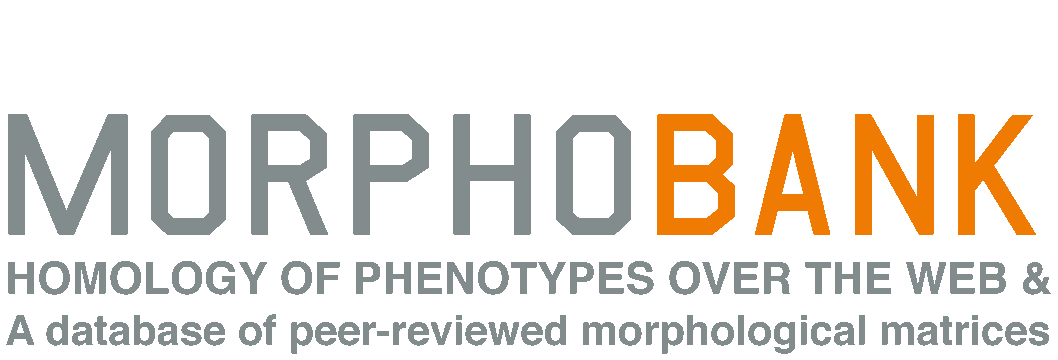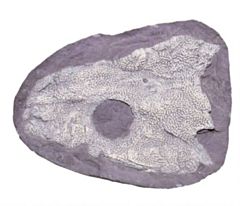Project 4844: M. Buchwitz, C. Foth, I. Kogan, S. Voigt. 2012. On the use of osteoderm features in a phylogenetic approach on the internal relationships of the Chroniosuchia (Tetrapoda: Reptiliomorpha). Palaeontology. 55 (3):623-640.
Abstract
Chroniosuchians are an enigmatic Permian to Triassic group of crocodile-like basal tetrapods. Their conspicuous dorsal osteoderm systems include most of the group’s yet documented postcranial morphological variability but have hardly been considered in cladistic approaches. Aiming at the clarification of the internal relationships of the Chroniosuchia, we have carried out a parsimony analysis including, among others, 23 morphological and osteohistological osteoderm characters and 12 chroniosuchian taxa. According to the most parsimonious trees, taxa usually referred to Chroniosuchidae form a paraphyletic succession with Madygenerpeton pustulatus and Chroniosaurus dongusensis as the basalmost chroniosuchians and Uralerpeton tverdochlebovae as the sister group of Bystrowianidae (hypothesis A). However, the concurrent hypothesis of a basal split into monophyletic subtaxa Chroniosuchidae and Bystrowianidae (hypothesis B) is only slightly less parsimonious and supported by an alternative analysis which includes embolomeres as the only reptiliomorph outgroup. Searching for the better hypothesis, we compare the respective order of branching to the order of first occurrences in the fossil record, demonstrating that hypothesis A provides a better stratigraphic fit than hypothesis B. Accordingly, the last common ancestor of the yet known chroniosuchians had a series of broad complexly interlocking ‘chroniosuchid’ osteoderms that served as a protection carapace apart from supporting the trunk during terrestrial locomotion. The later evolution of chroniosuchian carapaces was marked by a stepwise increase in flexibility and size reduction, which resulted in a loss of protective function and in a reduction in trunk support function. The flexibility increase is paralleled by the evolution of the Crocodylomorpha whose extant members do not possess as extensively interlocking osteoderm systems as some of their Mesozoic relatives.Read the article »
Article DOI: 10.1111/j.1475-4983.2012.01137.x
Project DOI: 10.7934/P4844, http://dx.doi.org/10.7934/P4844
| This project contains | Matrices |
|---|---|
Download Project SDD File | Total scored cells: 0 Total media associated with cells: 0 Total labels associated with cell media: 0 |
| Characters | |
| Total characters: 73 Total characters with associated media: 0 Total characters with media with labels: 0 Total character states: 154 Total character states with associated media: 0 Total character states with media with labels:0 Total unordered/ordered characters:73/0 |
Currently Viewing:
MorphoBank Project 4844
MorphoBank Project 4844
- Creation Date:
20 August 2023 - Publication Date:
21 August 2023
Authors' Institutions ![]()
- Technische Universität Bergakademie Freiberg (Freiberg University of Mining and Technology)
- Bayerische Staatssammlung fuer Palaeontologie und Geologie
Members
| member name | taxa |
specimens |
media | chars | character
| cell scorings (scored, NPA, "-") | cell
| rules | ||||||
| Joyce Song Project Administrator | 30 | 1 | 1 | 73 | 0 | 0 | 0 (0, 0, 0) | 0 | 0 | 0 | ||||
Taxonomic Overview for Matrix 'M29454' (30 Taxa)
| taxon | unscored cells |
scored cells |
no cell support |
NPA cells |
"-" cells | cell images | labels on cell images |
member access |
| [1] † Ichthyostega Taxon name last Modified on 08/20/23 | 73 | 0 | 0 | 0 | 0 | 0 | 0 | 1 |
| [2] † Pederpes Taxon name last Modified on 08/20/23 | 73 | 0 | 0 | 0 | 0 | 0 | 0 | 1 |
| [3] † Crassigyrinus Taxon name last Modified on 08/20/23 | 73 | 0 | 0 | 0 | 0 | 0 | 0 | 1 |
| [4] † Eucritta Taxon name last Modified on 08/20/23 | 73 | 0 | 0 | 0 | 0 | 0 | 0 | 1 |
| [5] † Greererpeton Taxon name last Modified on 08/20/23 | 73 | 0 | 0 | 0 | 0 | 0 | 0 | 1 |
| [6] † Balanerpeton Taxon name last Modified on 08/20/23 | 73 | 0 | 0 | 0 | 0 | 0 | 0 | 1 |
| [7] † Cochleosaurus Taxon name last Modified on 08/20/23 | 73 | 0 | 0 | 0 | 0 | 0 | 0 | 1 |
| [8] † Silvanerpeton Taxon name last Modified on 08/20/23 | 73 | 0 | 0 | 0 | 0 | 0 | 0 | 1 |
| [9] † Anthracosaurus Taxon name last Modified on 08/20/23 | 73 | 0 | 0 | 0 | 0 | 0 | 0 | 1 |
| [10] † Proterogyrinus Taxon name last Modified on 08/20/23 | 73 | 0 | 0 | 0 | 0 | 0 | 0 | 1 |
| [11] † Eoherpeton Taxon name last Modified on 08/20/23 | 73 | 0 | 0 | 0 | 0 | 0 | 0 | 1 |
| [12] † Palaeoherpeton Taxon name last Modified on 08/20/23 | 73 | 0 | 0 | 0 | 0 | 0 | 0 | 1 |
| [13] † Pholiderpeton Taxon name last Modified on 08/20/23 | 73 | 0 | 0 | 0 | 0 | 0 | 0 | 1 |
| [14] † Archeria Taxon name last Modified on 08/20/23 | 73 | 0 | 0 | 0 | 0 | 0 | 0 | 1 |
| [15] † Gephyrostegus Taxon name last Modified on 08/20/23 | 73 | 0 | 0 | 0 | 0 | 0 | 0 | 1 |
| [16] † Seymouria Taxon name last Modified on 08/20/23 | 73 | 0 | 0 | 0 | 0 | 0 | 0 | 1 |
| [17] † Limnoscelis Taxon name last Modified on 08/20/23 | 73 | 0 | 0 | 0 | 0 | 0 | 0 | 1 |
| [18] † Asaphestera Taxon name last Modified on 08/20/23 | 73 | 0 | 0 | 0 | 0 | 0 | 0 | 1 |
| [19] † Chroniosuchus Taxon name last Modified on 08/20/23 | 73 | 0 | 0 | 0 | 0 | 0 | 0 | 1 |
| [20] † Chroniosaurus dongusensis Taxon name last Modified on 08/20/23 | 73 | 0 | 0 | 0 | 0 | 0 | 0 | 1 |
| [21] † Chroniosaurus levis Taxon name last Modified on 08/20/23 | 73 | 0 | 0 | 0 | 0 | 0 | 0 | 1 |
| [22] † Uralerpeton Taxon name last Modified on 08/20/23 | 73 | 0 | 0 | 0 | 0 | 0 | 0 | 1 |
| [23] † Jarilinus Taxon name last Modified on 08/20/23 | 73 | 0 | 0 | 0 | 0 | 0 | 0 | 1 |
| [24] † Suchonica Taxon name last Modified on 08/20/23 | 73 | 0 | 0 | 0 | 0 | 0 | 0 | 1 |
| [25] † Madygenerpeton Taxon name last Modified on 08/20/23 | 73 | 0 | 0 | 0 | 0 | 0 | 0 | 1 |
| [26] † Bystrowiana Taxon name last Modified on 08/20/23 | 73 | 0 | 0 | 0 | 0 | 0 | 0 | 1 |
| [27] † Axitectum Taxon name last Modified on 08/20/23 | 73 | 0 | 0 | 0 | 0 | 0 | 0 | 1 |
| [28] † Dromotectum Taxon name last Modified on 08/20/23 | 73 | 0 | 0 | 0 | 0 | 0 | 0 | 1 |
| [29] † Synesuchus Taxon name last Modified on 08/20/23 | 73 | 0 | 0 | 0 | 0 | 0 | 0 | 1 |
| [30] † Bystrowiella Taxon name last Modified on 08/20/23 | 73 | 0 | 0 | 0 | 0 | 0 | 0 | 1 |

